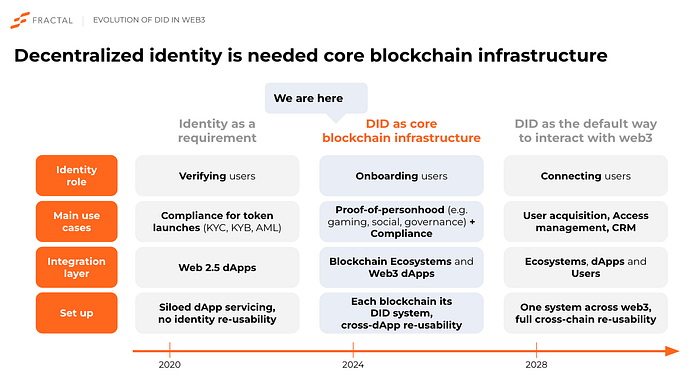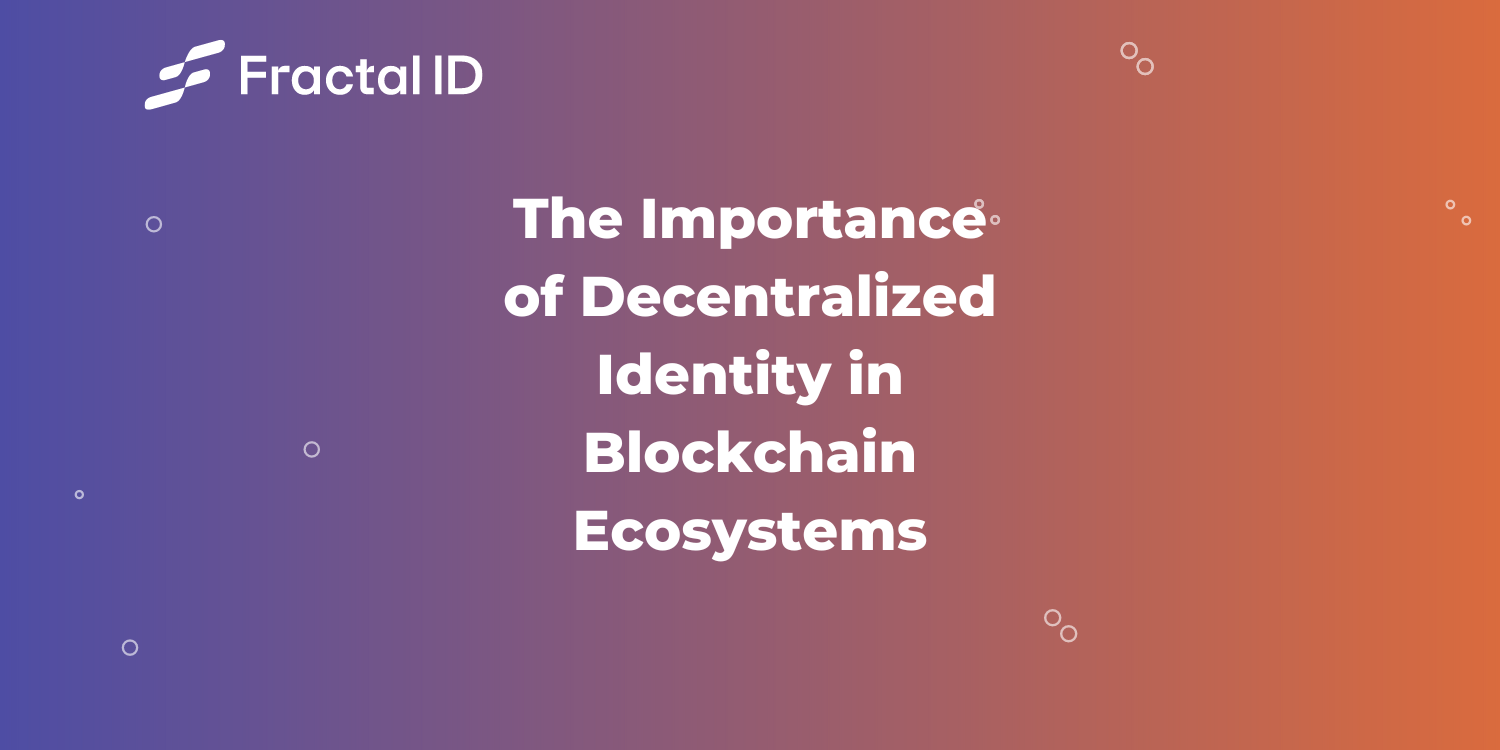1. Introduction
With the advent of blockchain technology, a new era is upon us with the promise of a more interconnected and transparent digital landscape. Powered by decentralized applications, smart contracts, and a wave of innovations, the potential of blockchain ranges across business verticals with a wide variety like financial services, healthcare, supply chain, etc already witnessing steady adoption.
As blockchain ecosystems expand and become more integrated, the need for robust and reliable decentralized identity systems must be addressed. Named by Gartner as a top emerging technology of 2023, decentralized identity, as thought leaders agree, is a crucial piece of the Web3 puzzle that can empower blockchain ecosystems to unlock their full potential.
In this blog post, we explore why DIDs are crucial to the growth of blockchain ecosystems, and how Fractal ID, as the leading identity solution provider for Web3, can support the effort.
Let’s jump in!
2. Why are DIDs gaining momentum?
Decentralized Identity has gained substantial momentum in recent years due to the limitations and drawbacks of traditional identity systems. The centralized and fragmented nature of the latter means that there are significant security and privacy risks with identity management including data breaches and identity thefts. Decentralized identity systems on the other hand, when integrated with blockchain ecosystems, empower user autonomy and offer a more trustworthy framework for identity verification.
But why this sudden spike in interest in decentralized identity?
The perception around the role of identity in blockchain ecosystems has undergone a massive transformation. Initially, the focus of identity in the blockchain space revolved primarily around compliance and regulation. Digital identity solutions aimed to address Know Your Customer (KYC) and Anti-Money Laundering (AML) requirements to ensure regulatory compliance in the financial services sector.
However, as blockchain ecosystems continue to evolve, there is a growing realization that identity has a far more vital role to play. Identity is no longer seen merely as a compliance necessity but as a crucial element that enhances user experience and facilitates a better way to interact with Web3 dApps. This marks a shift towards decentralized identity being integrated as a core blockchain infrastructure component — moving up from the dApp layer on a blockchain to its fundamental infrastructure layer just like explorers, wallets, and oracles.
In this light, several ecosystems of decentralized identity solutions, frameworks, and protocols have emerged that are working to facilitate adoption. However, while there are several monolithic identity solutions in Web3, what blockchain ecosystems now need are unified and shared standards in identity management and decentralized identity systems that can work across multiple chains seamlessly.

3. How are Blockchain Ecosystems Implementing DIDs?
In the coming months, we will see numerous blockchain ecosystems develop their internal decentralized identity systems. However, the key to success lies in ensuring interoperability among these diverse systems, enabling seamless communication and collaboration across different blockchains. While we are several years away from implementing a single identity standard that will work for everyone across Web3, what we can have today are systems that work with multiple standards.
Early efforts to integrate decentralized identity have already kick-started across Layer 1 (L1) and Layer 2 (L2) blockchains. For example, the XRP Ledger — a decentralized public blockchain led by a global developer community — leverages Fractal ID’s technical capabilities to empower decentralized apps via scalable and confidential on-chain identity verification. With Fractal ID, XRPL users are able to switch between dApps without additional authentication, increasing convenience and efficiency.
Another example of an ecosystem where decentralized identity solutions are being integrated to power next-generation dApps is Gnosis Chain. Fractal ID’s DID registry is being deployed to help streamline the onboarding process for Gnosis’ users while safeguarding user privacy. A single identity check is enough for them to be able to interact with all the dApps in the chain.

So the question we are faced with is: What benefits can blockchain ecosystems expect to unlock by integrating decentralized identity systems on their platforms?
Let’s explore them in detail.
4. Exploring the Relevance of Decentralized Identity Systems for Blockchain Ecosystems

4.1 Portability
DIDs bring the powerful advantage of identity portability within blockchain ecosystems. This empowers dApps on a blockchain network to seamlessly transfer verified identities across various dApps with a single click.
But why is this feature important?
Apart from reducing friction in terms of repetitive identity verification processes to access various dApps, identity portability enabled by decentralized identity also boosts user acquisition for blockchain ecosystems. Users can effortlessly import their existing identities across dApps without the need to repeat their onboarding process.
4.2 Interoperability
Not just across dApps within one blockchain ecosystem, decentralized identity also plays a crucial role in enabling multi-chain dApps to effectively manage users across different blockchain ecosystems in a fully-interoperable manner. DID-driven interoperability offers various benefits for blockchain ecosystems by simplifying the user experience and paving the way for steady adoption. With a single universal identifier, users can interact with a wide range of dApps across blockchain networks without the need for repeated verification processes each time they jump from one chain to another.
4.3 Better UX and Privacy
Traditionally, onboarding new users onto a blockchain ecosystem requires the creation of a wallet and complex seed phrases for key management. These can act as barriers to entry. With DIDs, blockchain ecosystems can simplify the onboarding process significantly. DIDs enable users to establish their identity on the blockchain without the need for a wallet upfront. They can also fully control their data and grant / revoke access to certain dApps in a completely privacy-preserving way. This makes getting started with blockchain ecosystems easier, making the platform more attractive to new users.
4.4 Enabling new use cases
By implementing DIDs across their ecosystem, Blockchains can ensure that dApps can build new, innovative decentralized solutions beyond the obstacles of compliance and sybil attacks.
How? Let’s consider an example.
For instance, there is a decentralized lending protocol built on a leading blockchain network that allows users to lend and borrow crypto securely. If the blockchain network has a decentralized identity integrated into its infrastructure, KYC and AML checks can be linked to wallets and DIDs to ensure user activities are compliant in Web3 in a tamper-proof way. This will eliminate costly manual KYC processes, enhance onboarding and further unlock new DeFi use cases.
Additionally, decentralized identity infrastructure will also protect dApps against sybil attacks. For example, in the context of Web3 game economies, the integration of decentralized identity can significantly enhance security and protect against manipulation by bots and multi-account users.
While the underlying technology might be the same, each blockchain ecosystem currently faces pertinent challenges, unique to their network that need to be addressed with decentralized identity systems. So the questions then become:
- How can blockchain ecosystems go about introducing adapted, tailored identity solutions to their ecosystem to address specific challenges for their dApps, simplify user onboarding and make the platform more attractive to users?
- How can they seamlessly meet data standards and complex compliance regulations along with ensuring full cross-chain interoperability for dApps in a cost-effective manner?
This is where Fractal ID comes in.
5. Unveiling the Power of Fractal ID for Blockchain Ecosystems
With a track record of trust across 220+ Web3 projects and over 1 million registered users, Fractal ID is the vertically integrated identity stack that works for everyone, everywhere. Leading blockchain ecosystems like Polygon, NEAR Protocol, XRP Ledger, Avalanche, Gnosis, and more, leverage Fractal ID’s decentralized identity management capabilities to meet data and regulatory standards, including GDPR compliance, carry out user verification via KYC/AML checks and ensure human liveliness.
What makes Fractal ID so different from other identity solution providers, you ask?
With re-usability, use-case-specific on-chain tooling, and interoperability as our guiding principles, Fractal ID’s identity solutions have grown with the market’s needs. From integrating incremental developer-friendly solutions like DID registry and building multiple ways to manage access to data, (e.g. APIs and Fractal ID credential wallet), to building and implementing full DID and Verifiable Credential systems, Fractal ID covers the full identity process from identity creation to developing tooling and access management infrastructure. The identity integration options are customized to cater to the specific requirements of different blockchain ecosystems making it easier to manage user identities.

Fractal ID serves as a connecting link between diverse networks, enabling the smooth transfer of credentials, and thereby fostering seamless collaboration across chains like Polygon, BNB Chain, Avalanche, Gnosis, Aurora, XRPL, and Acala. Additionally, with Fractal ID, blockchain ecosystems do not have to worry about getting users started on their platform. With dedicated resources, Fractal ID takes care of user onboarding — from start to finish and streamlines the process for better ecosystem usability.
Fractal ID allows blockchain ecosystems and their dApps to do more and fully leverage new decentralized use cases for Web3
If you are interested in exploring how decentralized identities (DIDs) can help you and your project, book a meeting with our team.
Want to learn more? Access our Medium articles:
Decentralized Identity Challenges & How To Tackle Them
Fractal ID X Gnosis: A Strong Collaboration to Expedite DID Adoption
Fractal ID & Polygon ID: A Powerful Duo for Decentralized Identity Adoption
Breaking Barriers: Fractal ID and XRPL Unite to bring KYC/AML processes to the XRPL Ecosystem
